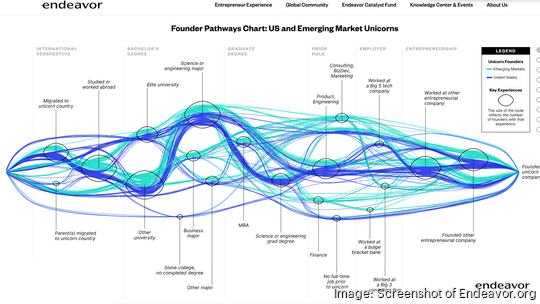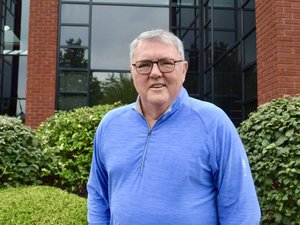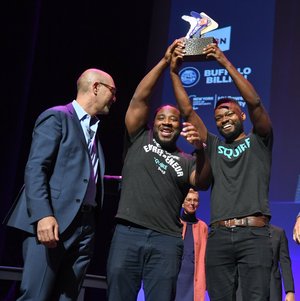
When you picture the stereotypical successful startup founder, you may imagine a white male with elite Ivy League connections. But the data tells a different story.
Endeavor Insight, the research division of Endeavor, analyzed the career pathways of 200 founders who started unicorn companies. (Endeavor is a global firm that runs a selective program around high-impact entrepreneurs, connecting them to business opportunities, funding and mentors.)
Among the results: Only about one-third of the unicorn founders have a bachelor’s degree from an “elite university.” More than half were immigrants or second-generation immigrants.
That’s especially good news for emerging tech ecosystems like Buffalo.
“From a founder perspective or an aspiring founder perspective, maybe you’re not a founder yet but you dream to be, I hope this report encourages and steels you to what you can really accomplish," said Alan Rosenhoch, managing director of Endeavor Western New York.
Yet many groups of minority founders still face added barriers in the tech-startup world and typically get fewer funding opportunities.
“In many cases, investors have over-indexed on some of those stereotypical characteristics and traits and are overinvesting into companies that don’t necessarily have the core unit economics or core value propositions that they need to to be successful in the long term,” he said.
In other words, investing in diverse founders is good business.
The Endeavor report also showed half of the unicorn founders previously worked at a startup or scale-up and that half are serial entrepreneurs (who have previously started a business before founding a unicorn company).
What does that mean for Buffalo?
With that in mind, Buffalo needs to continue attracting more locals, expats and migrants to the region to work at startups, according to Rosenhoch.
Oftentimes, people might think of working for a startup as being risky, and, while downturns can happen, the “upside is significant,” he said. Employees gain valuable knowledge that, even if the business fails, makes them more attractive to other startup employers than if they were part of a large corporate layoff.
And even big, established companies experience struggles and potential job cuts.
As an emerging tech ecosystem, the Buffalo region also needs seasoned talent from outside of the area that can harness experience and add on to an ecosystem that already has pros like a lot of local support, Rosenhoch said.
Vikas Mehta, ACV’s COO, is a great example. He joined the Buffalo unicorn several years ago after spending time in Silicon Valley and at companies including eBay and Allstate.
From Mehta’s perspective, Buffalo startups need to take the following steps to produce more unicorns: Start off with courage and an idea that aims to disrupt a status quo. Then, company leaders must be able to tell their stories well enough and convey their passion in order to make great hires.
“I think when you are early stage and you’re trying to build something that doesn’t quite exist and it’s more a vision and an idea than actual revenue and proof points, your ability to build that narrative and your ability to solicit that buy-in is so critical," he said. "Because no one can do it alone."
The next step is finding the best way to scale from a financial perspective, whether it’s raising a funding round or joining an accelerator or incubator.
Lastly, Buffalo must continue building up its startup ecosystem by entrepreneurs asking for and giving help. Many times there’s a desire among startup successes to give back because they’ve received support in the past. Mehta himself said he always learns from his talks with other entrepreneurs seeking help.
“It's a way to significantly increase the velocity of sharing experience, and it’s about tapping into an ecosystem that’s bigger than just the employees, customers and investors,” he said. “That I think it the X factor in being able to scale.”
Other main takeaways from the Endeavor Insight report
- 20% of unicorn founders worked for an “elite employer."
- The average founder had 10 years of work experience.
- Science and engineering training is more common than business.








